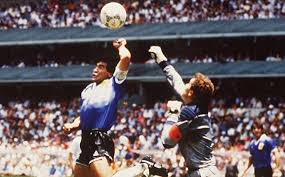By Andrew Warshaw
March 5 – Bowing to pressure from legions of pundits and fans frustrated about crucial goals being unfairly ruled out, football’s global lawmakers today agreed to backtrack and scrap accidental handball whenever it leads to a team-mate scoring.
In a move that will come into effect on July 1, the ruling by the International Football Association Board (IFAB) follows widespread condemnation of the current regulations.
“Accidental handball that leads to a teammate scoring a goal or having a goal-scoring opportunity will no longer be considered an offense,” IFAB said in a statement after the body’s annual meeting, this year conducted virtually.
Only the goal scorer himself or herself who is guilty of the offense will in future be penalised but whilst the apparent climbdown will be widely welcomed, it will only appease opponents of the old rule up to a point.
In terms of defenders who can’t get out of the way when struck by the ball, IFAB didn’t scrap any part of the law but did go as far as to give referees greater flexibility to “use their judgement” when assessing the position of hands and arms and whether they are in an unnatural position.
“As the interpretation of handball incidents has not always been consistent due to incorrect applications of the law…. not every touch of a player’s hand/arm with the ball is an offense,” IFAB said.
Attempts to provide a more precise definition of handball in 2019 have only succeeded in doing the exact opposite, with goals having to be disallowed regularly for totally unintentional offences, infuriating players, officials and fans alike.
Even UEFA president Aleksander Ceferin wrote to his FIFA counterpart Gianni Infantino last October calling for the rule to be scaled back.
Infantino admitted that IFAB may have gone too far in the past and had now gone “one step back” after observing various competitions across the world, and that IFAB had amended the law in the “spirit” of the game.
“It is fair to say that after analysing everything it was felt that this was (previously) maybe going one step too far,” said Infantino who attended today’s meeting from FIFA headquarters in Zurich. “This was the perception of the public.”
Yet anyone who thinks VAR is being scrapped will be disappointed.
“I have nothing negative to say about VAR,” Infantino told a post-IFAB virtual press conference, stressing it had done far more good than harm.
“It is making the game more clean and helping referees make correct decisions,” he said. “If it takes away the joy for some, it adds it for others when a decision is changed for the better. Everyone prefers to win a game that is not based on a referee’s mistake.”
Pierluigi Collina, the chairman of the FIFA referees committee, also admitted that the lawmakers had “gone too far” in disallowing goals when the ball had been accidentally handled by a teammate, while David Elleray, the IFAB Technical Director, added: “Handball will always be a problem in the sense it will always be a subjective judgement.”
“Handball is always going to be a journey to an ideal but we’ll never get there because it’s a subjective area. And we have to accept that. That is why applying the spirit is the most important aspect of the law.”
IFAB also confirmed it is reviewing “potential adaptions to the offside law” including the ground-breaking idea of semi-automated decisions. Currently, a player is considered offside if any part of his or her body stretches past the last defender. The aim is to speed up the VAR process and make offside fairer.
Contact the writer of this story at moc.l1744801932labto1744801932ofdlr1744801932owedi1744801932sni@w1744801932ahsra1744801932w.wer1744801932dna1744801932

